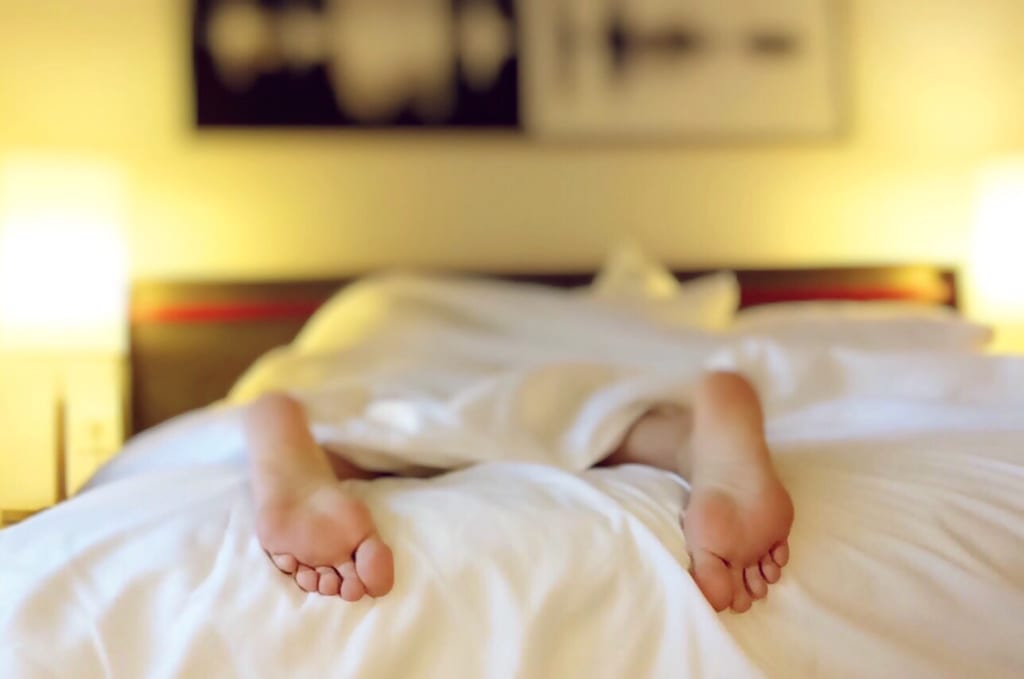
Imagine you are about to fall asleep and you start counting sheep in your head. All of a sudden, you feel pressure on your chest and sense a presence in the room. Despite being awake and alert, you are unable to move a muscle. This is called sleep paralysis.
Paralysis occurs when you are just starting to wake up from sleep or when you are about to go to sleep. About 8% of the population experiences sleep paralysis, which can last anywhere from 20 seconds to a few minutes.
Some common feelings and sensations include being aware of your surroundings but unable to move, feeling as though your chest is heavy and compressed, having trouble breathing or feeling as though you're about to choke, and experiencing hallucinations, which are the perception of a presence in an intense sense of fear or dread. Some even mention feeling as though they are about to pass away, hearing footsteps approaching, seeing intruders, demons, or spirits. While the person who is experiencing sleep paralysis is not in any physical danger, they are unable to awaken and must wait for it to go away.

In contrast to nightmares or night terrors, sleep paralysis occurs while the body is still asleep, but the brain is awake and it is immobile as a result. The most fascinating thing about sleep paralysis is that it has a history that dates back to the 10th century and affects people of all races equally. In actuality, people from numerous cultures have used sleep paralysis to explain supernatural phenomena like witchcraft ghosts and alien abduction.
There are two types of sleep paralysis: hypnagogic and hypnopompic. These two terms refer to a difference in time at which sleep paralysis occurs. Hypnagogic also known as predormital is when sleep paralysis occurs at sleep onset or just before falling asleep. On the other hand hypnopompic also known as post dormital refers to sleep paralysis that occurs just after waking up, at the transition from sleep to awakening in order to understand how sleep paralysis occurs we have to understand what REM sleep is.
Your brain cycles through five distinct stages while you sleep: stage 1, stage 2, stage 3, stage 4, and stage 5, also known as the rapid eye movement stage or REM for short. Because your sleep cycle is repeated throughout the night, REM sleep cycles, which make up 25% of your total sleep, can happen multiple times. REM is significant because when your body gets its energy and when dreams happen, your motor neurons and spinal cord get signals during REM that shut down movement, temporarily impairing your ability to move your arms and legs. This acts as a safeguard to stop you from hurting yourself or others while you are dreaming.
It is believed that a malfunction in the flip-flop switch that regulates REM sleep is what causes sleep paralysis. According to one theory, REM sleep functions as a switch between two stages: "REM-on" when it happens and "REM-off" when it doesn't. This mechanism enables effortless entry and exit from REM sleep. The wake-sleep switch is overridden by the REM switch. Typically, "REM-on" takes place while you are sleeping. The neurons controlling the wake side of the wake-sleep switch and the neurons controlling the "REM-off" side of the REM switch, however, are diminished when sleep paralysis develops. As a result, muscle movement that shouldn't be occurring while the body is relatively awake can be stopped by the REM on neurons. This could result in sleep paralysis. Negative feelings are another frequent occurrence during REM sleep. This is due to the amygdala, a region of the brain involved in processing fear, being active throughout REM sleep.

So how can sleep paralysis be prevented? It depends on a variety of variables whether you will actually experience it. An 862 participant twin study revealed that genetics are at least largely responsible for sleep paralysis, with researchers discovering that 53% of cases were caused by genes. Sleep paralysis is more likely to occur if you have a sleep condition. The sleeping condition known as narcolepsy, which is characterized by excessive and uncontrollable daytime sleepiness, frequently manifests as sleep paralysis.
In general, sleep paralysis is linked to poor mental health, which has been shown to result in higher scores on self-reported measures of low mood and anxiety if you frequently don't get enough sleep and sleep on your back. As we have seen, there are many factors associated with sleep paralysis like genetics or sleep disorders and poor mental wellness. Higher scores on self-reported measures of depressed mood and anxiety have been associated with sleep paralysis research focusing on sleep paralysis and patients with PTSD would higher prevalence as well as another study has linked bipolar disorder to sleep paralysis.

Are there any other treatments that might be effective for preventing sleep paralysis? There is no universal treatment for treating sleep paralysis, but there are some preventative and management techniques that lack widespread agreement among researchers in terms of their effectiveness. Some researchers have suggested that treating underlying sleep disorders that are mental illness disorders may help with prevention of sleep paralysis, and some pharmaceuticals like antidepressants may also help. Although experiencing sleep paralysis can be extremely frightening, there are no immediate dangers or health risks associated with it.
In conclusion, sleep paralysis is a common phenomenon that occurs when the mind is awake, but the body is still asleep. While it can be a frightening experience, it is not usually a cause for concern. However, if it occurs frequently and interferes with daily life, it is important to seek medical attention. By understanding the causes and symptoms of sleep paralysis, individuals can take steps to prevent it from happening or alleviate the effects. Overall, while sleep paralysis can be a disconcerting experience, it is a natural part of the sleep cycle and can be managed with the right knowledge and care.






Comments
There are no comments for this story
Be the first to respond and start the conversation.